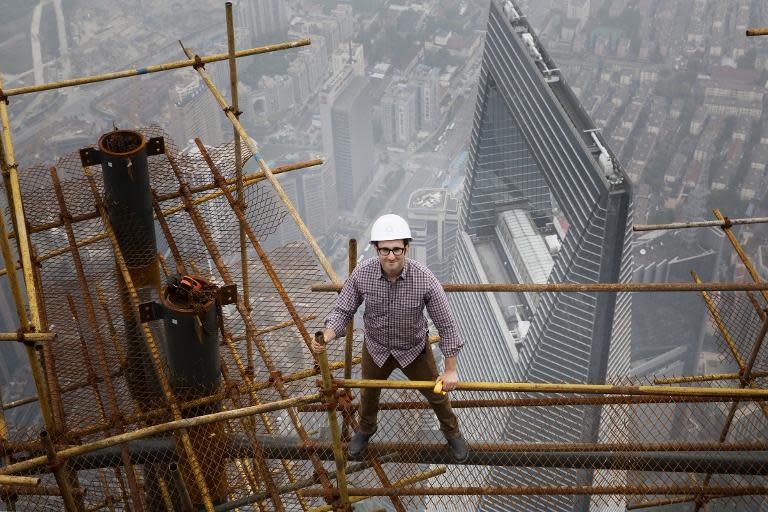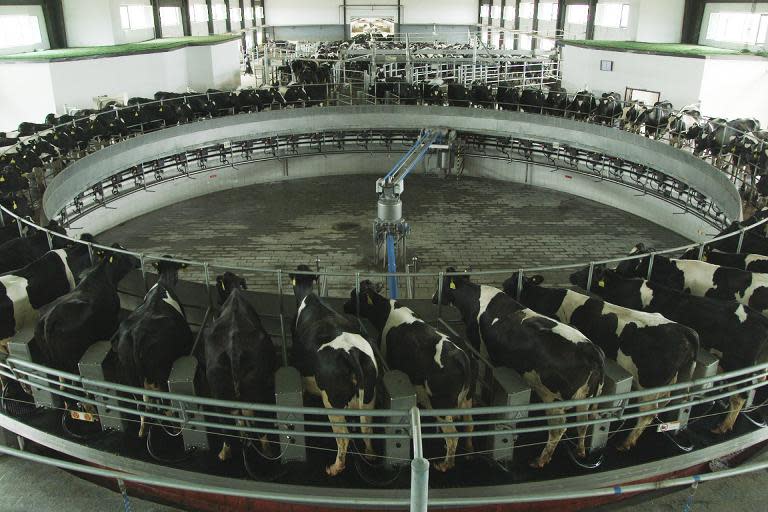China's soft-power push, coming to a TV near you
A hard hat-clad American TV host grips the bamboo-and-steel scaffolding, the dizzying urban landscape of China's commercial centre Shanghai unfolding far below him. "I'm bringing cameras and questions to places outsiders are rarely permitted, to investigate the aspirations of the world's fastest-growing middle class," architect Danny Forster tells Discovery viewers. There is just one catch: both the cameras -- and the questions -- are co-funded by the Chinese government. Beijing has long sought to boost its "soft power" abroad, spending billions of yuan on expanding the international presence of its state-run media -- including broadcaster CCTV and official news agency Xinhua -- and through its ubiquitous government-sponsored language centres, known as Confucius Institutes. Now, the ruling Communist Party appears to be pursuing a new tactic: Investing heavily in "documentaries" on China that are hosted by foreign TV personalities and air on major international networks, but are created under the auspices of the party's messaging chiefs. The State Council Information Office (SCIO), the propaganda arm of China's Cabinet, unveiled its latest such effort this week in Beijing at the premiere of "How China Works", a three-part series that will air on The Discovery Channel. The show -- hosted by Forster and created "with the support and guidance" of the SCIO -- is part of a three-year deal in which Discovery will air an hour of Beijing-approved, China-themed programming each week, reaching 90 million viewers in 37 countries and territories. Discovery executives declined to detail the financial terms of the deal, dubbed "Hour China". "To tell a good Chinese story, it won't be enough to rely just on our media," Cui Yuying, deputy director of the SCIO, said at the series' launch ceremony. "We look forward to seeing such strong and influential global media as The Discovery Channel tell an amazing Chinese story." - 'China Dream' - Discovery and China's State Council have been working together since 2004, and the global TV giant has since produced 65 hours of China-themed programming. Its previous series include "Long March Into Space", on Beijing's ambitious space programme; and "Rebuilding Sichuan" about the government-led recovery effort following the devastating 2008 quake in southwest China. More than 5,000 children were killed in that disaster when their schools collapsed, which devastated parents blame on shoddy construction facilitated by corruption. But "Hour China" appears to be the pair's most ambitious deal as Beijing seeks to burnish its image abroad. Forster, a Harvard-trained architect, has presented "Extreme Engineering" and "Build It Bigger" on Discovery and the Science Channel, and Wednesday's launch event featured strobe lights and thumping music. Discovery executives gushed about their collaboration with the SCIO and posed onstage for photos with Chinese government officials. "We all know China is the factory to the world -- the manufacturing capital -- but the new China of tomorrow is more innovation-centric," said Vikram Channa, vice president of production and development for Discovery Networks Asia-Pacific. The new series will tell the story of "the new emerging China, the China dream", he said -- citing President Xi Jinping's catchphrase. - 'World stage' - Enrique Martinez, acting president of Discovery Networks Asia-Pacific, maintained the programme was "a complete brainstorm" between SCIO and Discovery and that the network retained editorial control. "Obviously, we have to pass certain filters editorially within our organisation as well as from a regulatory standpoint for transmissions around different places in the world," he said. Asked whether the series amounted to an "advertorial" funded by the Chinese government, he responded: "I'd say watch the shows. They're incredible, insightful, and just extremely deep analyses of what is transpiring. "One of the things that are very clear right now is that China is on the world stage." Beijing tightly controls expression within China but has a broader goal to expand its cultural influence abroad. CCTV increased its employees abroad nearly tenfold from 2010 to 2013, the broadcaster's Europe bureau chief has said, with more than 400 staffers currently stationed in 70 foreign locations. Chinese state media have also established a presence on Facebook, Twitter, YouTube and other social media sites banned in the country. But China's soft power "partnerships" have frequently backfired or had clunky results. Universities in the US, Canada and Sweden have rejected Confucius Institute deals over concerns that the Beijing-backed centres compromise academic freedom, while some recent China-Hollywood "co-productions" -- requiring China-related plot lines or Chinese cast -- have struggled at the box office. The "Hour China" deal with Discovery -- whose parent company Discovery Communications calls itself the "#1 Pay-TV Programmer in the World" -- represents a new approach by Beijing, experts say. "This concern about trying to influence the international narrative about China has been on China's mind for a long time," said Merriden Varrall, East Asia Programme Director at the Lowy Institute for International Policy in Sydney. "They've shifted to doing it in a much more sophisticated way." Jeremy Goldkorn, founder of Beijing-based Danwei which tracks Chinese media and the Internet, said SCIO's role was "to present the Chinese government point of view". "What is quite funny is that Discovery Channel is saying it's a documentary," he added. "If Discovery Channel think there's no politics involved in this, they are kidding themselves."



